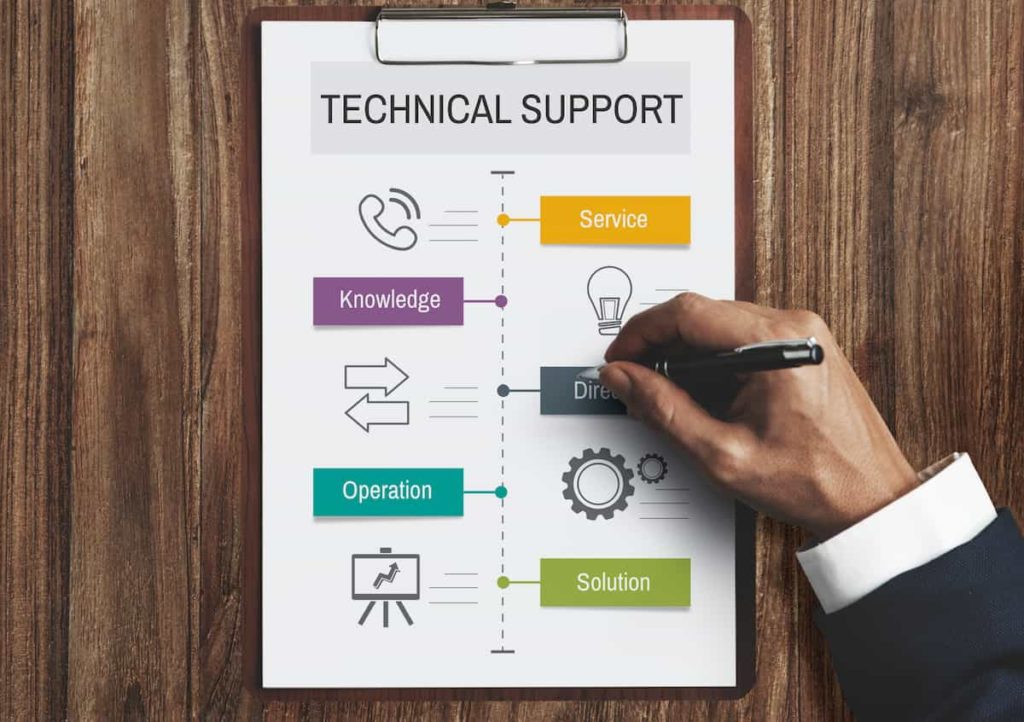In the intricate landscape of modern business, technical support plays a pivotal role in ensuring both business continuity and customer satisfaction.
As companies navigate through the challenges of maintaining complex technologies and meeting customer expectations, the need for robust technical support becomes more pronounced than ever.
In this dynamic environment, the concept of outsourced technical support emerges not merely as a passing trend but as a strategic business decision with far-reaching implications.
Businesses are increasingly recognizing its value to specialized providers, acknowledging that doing so can enhance operational efficiency, elevate customer experiences, and allow them to focus on core competencies.
This article delves into the crucial considerations surrounding this concept, aiming to guide businesses in determining whether this strategic move aligns with their unique needs and objectives.
What is Outsourced Technical Support?
Outsourced technical support is a strategic business practice where companies entrust their technical support functions, including customer service and specialized technical assistance, to external service providers.
This model encompasses a spectrum of services, ranging from basic inquiries to more complex technical problem-solving.
The primary components include customer service representatives handling general queries and skilled technical professionals providing in-depth support for intricate technical issues.
This has become a cornerstone for businesses aiming to drive growth and enhance operational efficiency. By outsourcing these functions, companies can tap into the expertise of specialized teams without the need to invest extensively in in-house infrastructure and training.
This approach allows businesses to focus on their core competencies while leveraging the proficiency of external technical support providers.
The decision to outsource technical support is often motivated by the recognition that customer service and technical problem resolution are critical aspects of business success.
As firms grow, managing an increasing volume of customer inquiries and technical issues can become overwhelming.
Doing so provides a scalable solution that adapts to the evolving needs of a business, ensuring that customer satisfaction remains high and technical challenges are promptly addressed.
It also offers various advantages that contribute to both business growth and operational efficiency.
Firstly, it allows companies to access a pool of skilled professionals who specialize in different technical domains. This ensures that customer queries, ranging from basic troubleshooting to intricate technical challenges, can be handled with precision and expertise.
Moreover, its scalability is a key driver for business growth. As demands fluctuate, external service providers can adjust their resources to meet the changing needs of the business.
This flexibility ensures that companies have the necessary support during peak periods without the burden of maintaining a large, in-house support team during slower times.
It is a cost-effective solution that aligns with the dynamic nature of customer support requirements.
Operational efficiency is also significantly enhanced through outsourced technical support.
External providers often utilize advanced technologies and tools to streamline processes, manage ticketing systems, and ensure swift problem resolution. This not only improves the overall customer experience but also allows businesses to allocate their internal resources more strategically.
All in all, outsourced technical support involves delegating customer service and technical assistance functions to external service providers.
This approach is designed to drive business growth and operational efficiency by leveraging specialized expertise, scalability, and advanced technologies.
As businesses recognize the critical role of customer support in their success, this type of support emerges as a strategic solution to meet the evolving needs of a growing customer base while optimizing internal operations.
The Strategic Advantages of Outsourcing Technical Support
Outsourcing these services can be a strategic move for businesses, offering a range of advantages that extend beyond mere cost considerations.
Conducting a thorough cost-benefit analysis reveals the financial implications and savings associated with it.
Often, businesses find that outsourcing proves more cost-effective than maintaining an in-house support team. This analysis should encompass factors such as recruitment, training, infrastructure, and ongoing operational expenses.
By externalizing these tasks, firms can redirect funds toward core activities, promoting financial efficiency.
Scalability and flexibility are crucial in this dynamic landscape. When businesses opt for outsourced tech support, they gain a significant edge in adapting to changing needs and demands.
External service providers are well-equipped to scale their operations according to the business requirements.
During periods of increased activity or product launches, businesses can effortlessly expand their technical support without the complexities of hiring and training additional in-house staff.
This flexibility ensures that they can maintain optimal customer service levels even during peak times, fostering satisfaction and loyalty.
One of its standout benefits is the access to specialized expertise.
External service providers often employ professionals with diverse skills and experiences. This diversity allows businesses to tap into a pool of specialized knowledge, staying ahead with the latest technologies and industry practices.
In-house teams may find it challenging to match the breadth of expertise that outsourcing can provide.
Access to specialized skills not only resolves technical issues efficiently but also positions businesses at the forefront of innovation.
By leveraging the expertise of outsourced technical support, companies can navigate complex technical challenges and stay competitive in rapidly evolving industries.
Pros and Cons of Outsourced Technical Support
Outsourcing technical support can be a strategic move for businesses, offering a range of advantages and potential drawbacks.
Understanding these can help organizations make informed decisions about whether this is the right fit for their business needs.
Advantages
One of the primary advantages of outsourced technical support is cost efficiency.
Many businesses find that outsourcing can significantly reduce operational costs compared to maintaining an in-house technical support team.
This arises from leveraging the expertise of external service providers who may operate in regions with lower labor costs.
Another benefit is the access to a pool of specialized skills and expertise.
Outsourced technical support providers often have a team of professionals with diverse skills and experiences. This can lead to quicker issue resolution and improved customer satisfaction as technical problems are addressed promptly and effectively.
Example
A global software company opted to outsource its technical support to a specialized service provider.
This allowed the company to tap into a team with extensive knowledge of various software issues. As a result, the company experienced a notable reduction in average resolution time and an increase in customer satisfaction scores.
Drawbacks
Despite the advantages, there are potential drawbacks to outsourcing technical support.
One major concern is the risk to data security and confidentiality.
Sharing sensitive information with an external party poses inherent security risks. Therefore, businesses must carefully vet outsourcing partners, ensuring they have robust security measures in place.
Another drawback is the potential for a disconnect between the outsourced team and the company’s values or customer service standards.
If the provider’s priorities do not align with the business’s ethos, it may lead to a less cohesive customer experience.
Example
A telecom company faced challenges when outsourcing its technical support overseas.
Despite the cost savings, language barriers and cultural differences resulted in miscommunication and a decline in customer satisfaction.
The company had to reevaluate its outsourcing strategy and bring some support functions back in-house to address these issues.
In conclusion, the decision to outsource technical support comes with both benefits and risks.
It is crucial for businesses to conduct a thorough analysis of their specific needs, the capabilities of potential outsourcing partners, and the potential impact on customer experience.
Real-world examples illustrate that successful outsourcing requires careful consideration, ensuring that the chosen provider aligns with the business’s values and can deliver the expected level of service.
How to Choose the Right Outsourced Technical Support Call Center
Outsourcing technical support is a strategic move for many businesses, offering the potential for enhanced customer service and cost efficiency.
However, selecting the right call center requires careful consideration of various criteria to ensure alignment with business values and technical needs.
Aligning with Business Values and Technical Needs
The first and foremost consideration in choosing an outsourced technical support call center is aligning with the business’s core values and technical requirements.
Understanding the provider’s commitment to your company’s ethos ensures a harmonious partnership. This involves assessing their understanding of your industry, products, and customer base.
A provider deeply rooted in similar values is more likely to seamlessly integrate with your business operations.
Due Diligence and Vetting Process
Conducting due diligence is critical to ensure that your call center can meet your business requirements effectively.
Start by thoroughly assessing their track record. A proven history of successfully handling technical support for businesses similar to yours is a strong indicator of competence.
Client testimonials and case studies can provide valuable insights into the provider’s ability to deliver results.
Reviewing Service Level Agreements (SLAs) is another crucial step in the vetting process.
These define the terms and conditions of the outsourcing arrangement, including response times, issue resolution benchmarks, and overall service quality.
It is essential to ensure that these SLAs align with your business goals and customer service standards.
Understanding the provider’s approach to customer service and technical outsourcing is equally important. Evaluate their philosophy, communication channels, and responsiveness.
Effective technical support involves more than issue resolution; it requires a commitment to customer satisfaction and ongoing improvement.
Assess their methodologies for staying abreast of technological advancements, ensuring that their technical capabilities align with your business’s evolving needs.
Technical Expertise and Specialization
An outsourced technical support call center must possess the necessary technical expertise to handle your specific requirements.
Evaluate the provider’s technical skillset, ensuring they have proficiency in the technologies relevant to your business.
Specialization in your industry or sector is an added advantage, as it demonstrates a deeper understanding of the unique challenges and nuances associated with your technical support needs.
Scalability and Flexibility
The ability to scale services according to your business’s growth or seasonal fluctuations is a key consideration.
The outsourced technical support call center should have the flexibility to accommodate increased service demands without compromising quality.
A provider capable of scaling up or down efficiently ensures that your business receives optimal support regardless of varying work volumes.
Best Practices for Managing an Outsourced Technical Support Team
This can be a strategic move for businesses looking to enhance their customer service capabilities while managing costs effectively.
However, the success of this endeavor hinges on effective management practices.
Here are key best practices for seamlessly integrating an outsourced technical support team with existing in-house operations, maintaining a unified company culture, and ensuring high service quality.
Integration with In-House Operations
- Clear Communication Channels: Utilize project management tools, video conferencing, and collaborative platforms to ensure real-time communication.
Regular virtual meetings can foster a sense of unity and keep everyone aligned with common goals. - Unified Training Programs: Implement a standardized training program that ensures both in-house and outsourced teams have a comprehensive understanding of the company’s products, services, and customer service ethos.
Consistent training promotes a unified approach to problem-solving and customer interaction. - Shared Documentation: Use centralized document repositories and knowledge bases accessible to both teams.
This promotes a shared understanding of common issues, solutions, and best practices.
Collaborative documentation ensures that everyone is working from the same informational playbook.
Company Culture and Service Quality
- Cultural Sensitivity: Acknowledge and respect cultural differences to foster an inclusive environment.
Encourage cross-cultural training sessions to promote understanding and teamwork.
A cohesive company culture is integral to delivering consistent and high-quality service. - Shared Values and Objectives: Clearly communicate the company’s values and objectives to the outsourced team.
Align their goals with those of the in-house team to create a unified approach toward customer satisfaction.
Regularly revisit and reinforce these shared values to maintain a cohesive work environment. - Performance Metrics and Monitoring: Implement standardized performance metrics that are applicable to both in-house and outsourced teams.
Regularly monitor and evaluate performance against these metrics to ensure consistency in service quality.
A shared performance framework promotes accountability and continuous improvement.
Collaboration Models and Communication Frameworks
- Agile Methodologies: Adopt these methodologies to enhance collaboration and responsiveness.
Agile frameworks, such as Scrum or Kanban, allow teams to adapt quickly to changing priorities and ensure a seamless workflow. - Unified Communication Platforms: Invest in robust communication platforms that facilitate real-time collaboration.
Instant messaging, video conferencing, and shared project spaces help bridge geographical gaps and ensure efficient communication between in-house and outsourced teams. - Regular Team-Building Activities: Organize regular team-building activities that involve both in-house and outsourced team members.
Virtual or in-person events create opportunities for social interactions, fostering a sense of camaraderie and teamwork.
Strong interpersonal relationships positively impact collaboration and overall team performance.
Detailed Overview of Outsourced Technical Support Services
Outsourced technical support services have become a pivotal component for businesses seeking efficient and scalable solutions to address their IT challenges.
This section delves into a comprehensive examination of the specific services offered within this realm, exploring diverse service models that cater to the unique needs of various industries and business sizes.
One prominent facet is the provision of 24/7 support. This model ensures that businesses receive assistance around the clock, mitigating the impact of technical issues irrespective of the time zone or geographic location.
The significance of 24/7 support becomes particularly apparent in the digital age, where global business operations necessitate continuous IT functionality.
For instance, an e-commerce platform serving customers across different continents could greatly benefit from a round-the-clock technical support service to promptly address issues and ensure uninterrupted service.
On-demand assistance is another valuable service model under this umbrella. This allows businesses to seek help as needed, providing a flexible and cost-effective solution.
For smaller enterprises or those with fluctuating requirements, on-demand assistance ensures they only pay for the services they use.
An example of this could be a startup launching a new product; they might experience a surge in technical support needs during the initial phase and can leverage on-demand assistance to meet these temporary requirements without committing to a full-time support team.
Dedicated support teams represent a more tailored and hands-on service model.
In this approach, firms have a dedicated team of technical experts at their disposal, fostering a deep understanding of their unique IT infrastructure and specific challenges.
This model is ideal for larger enterprises with complex IT ecosystems that demand ongoing attention.
For instance, a multinational corporation with intricate software integrations might opt for a dedicated team to ensure immediate and personalized assistance whenever issues arise.
The versatility of these services extends to their customization for different industries and business sizes.
For example, a financial institution may require specialized support to ensure the security and compliance of their systems.
In contrast, a creative agency might prioritize support that aligns with the unique software tools integral to their design processes.
The flexibility to tailor technical support services to the distinct needs of each industry underscores the adaptability of outsourcing solutions.
Moreover, this support is scalable, accommodating businesses of varying sizes.
Small and medium-sized enterprises (SMEs) may opt for on-demand assistance to manage costs efficiently, while larger enterprises might engage dedicated support teams to meet the demands of their expansive IT infrastructure.
This allows businesses to align their technical services with their current needs while providing room for future growth.
To sum up, the landscape of outsourced technical support services is characterized by its breadth and adaptability.
Whether a business requires continuous support, on-demand assistance, or a dedicated team, technical support outsourcing offers tailored solutions that transcend industry boundaries and cater to businesses of diverse sizes.
This flexibility positions technical support as a strategic ally in navigating the complex terrain of contemporary IT challenges.
The Future of Outsourcing of IT Services
The landscape of IT outsourcing is undergoing a transformative shift with the integration of cutting-edge technologies such as Artificial Intelligence (AI), machine learning, and automation.
These innovations are reshaping traditional technical support services, offering businesses unprecedented opportunities for enhanced efficiency and improved customer experiences.
One notable advancement is the incorporation of AI-powered chatbots and virtual assistants into technical support frameworks.
These intelligent systems can provide immediate responses to common queries, troubleshoot issues, and even perform routine tasks, allowing businesses to offer round-the-clock support without the need for extensive human intervention.
The result is faster issue resolution, increased customer satisfaction, and significant cost savings for businesses.
Machine learning is another game-changer. By analyzing vast datasets, machine learning algorithms can identify patterns, predict potential issues, and continuously improve the accuracy and effectiveness of technical support services.
This proactive approach not only minimizes downtime but also allows firms to adopt a preventive rather than a reactive stance, addressing potential problems before they escalate.
The automation of routine and repetitive tasks is a key focus in the evolution of IT outsourcing.
By leveraging robotic process automation (RPA), businesses can streamline workflows, reduce manual errors, and enhance the overall efficiency of technical support processes.
This not only accelerates issue resolution but also frees up human resources to focus on more complex and strategic aspects of IT management.
Predicting the future of service models in IT outsourcing suggests a continued integration of these advanced technologies.
Service providers are likely to offer more sophisticated AI-driven solutions, providing businesses with highly tailored and efficient technical support.
The evolution of these models may also see an increased emphasis on personalized customer interactions, as AI algorithms become more adept at understanding and responding to individual needs.
Conclusion
In this guide, we explored the viability of outsourced technical support for businesses.
It emerges as a strategic solution, offering scalability, specialized expertise, and cost-effectiveness.
In today’s dynamic business tech environment, this is not just advantageous; it’s imperative for staying competitive.
Outsourced technical support services play a vital role in navigating the complexities of evolving technologies.
For those considering this strategic move, engage with reputable outsourcing partners, assess tailored solutions, and align your business with the agility and expertise needed for success in the modern business landscape.





